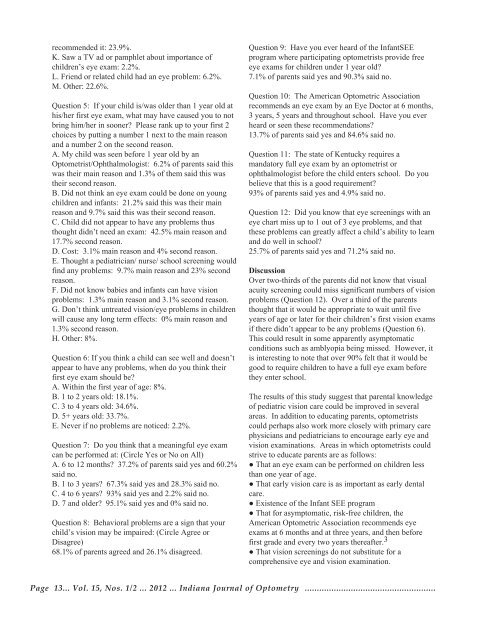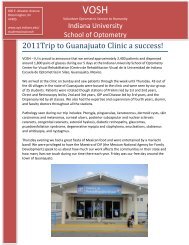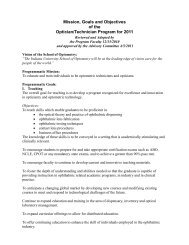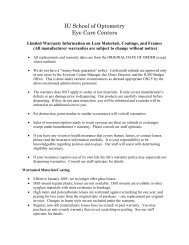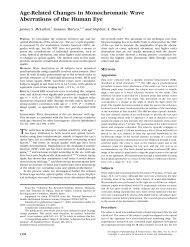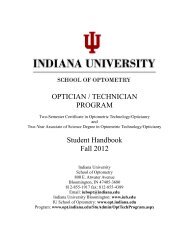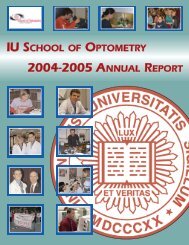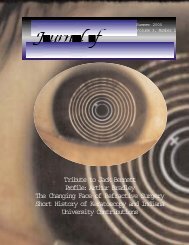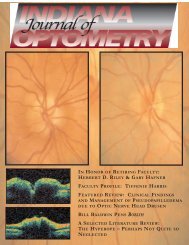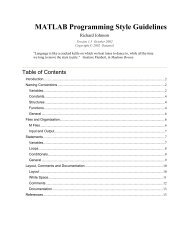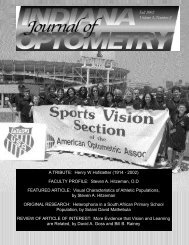Fall 2012 - Indiana University School of Optometry
Fall 2012 - Indiana University School of Optometry
Fall 2012 - Indiana University School of Optometry
You also want an ePaper? Increase the reach of your titles
YUMPU automatically turns print PDFs into web optimized ePapers that Google loves.
ecommended it: 23.9%.<br />
K. Saw a TV ad or pamphlet about importance <strong>of</strong><br />
children’s eye exam: 2.2%.<br />
L. Friend or related child had an eye problem: 6.2%.<br />
M. Other: 22.6%.<br />
Question 5: If your child is/was older than 1 year old at<br />
his/her first eye exam, what may have caused you to not<br />
bring him/her in sooner? Please rank up to your first 2<br />
choices by putting a number 1 next to the main reason<br />
and a number 2 on the second reason.<br />
A. My child was seen before 1 year old by an<br />
Optometrist/Ophthalmologist: 6.2% <strong>of</strong> parents said this<br />
was their main reason and 1.3% <strong>of</strong> them said this was<br />
their second reason.<br />
B. Did not think an eye exam could be done on young<br />
children and infants: 21.2% said this was their main<br />
reason and 9.7% said this was their second reason.<br />
C. Child did not appear to have any problems thus<br />
thought didn’t need an exam: 42.5% main reason and<br />
17.7% second reason.<br />
D. Cost: 3.1% main reason and 4% second reason.<br />
E. Thought a pediatrician/ nurse/ school screening would<br />
find any problems: 9.7% main reason and 23% second<br />
reason.<br />
F. Did not know babies and infants can have vision<br />
problems: 1.3% main reason and 3.1% second reason.<br />
G. Don’t think untreated vision/eye problems in children<br />
will cause any long term effects: 0% main reason and<br />
1.3% second reason.<br />
H. Other: 8%.<br />
Question 6: If you think a child can see well and doesn’t<br />
appear to have any problems, when do you think their<br />
first eye exam should be?<br />
A. Within the first year <strong>of</strong> age: 8%.<br />
B. 1 to 2 years old: 18.1%.<br />
C. 3 to 4 years old: 34.6%.<br />
D. 5+ years old: 33.7%.<br />
E. Never if no problems are noticed: 2.2%.<br />
Question 7: Do you think that a meaningful eye exam<br />
can be performed at: (Circle Yes or No on All)<br />
A. 6 to 12 months? 37.2% <strong>of</strong> parents said yes and 60.2%<br />
said no.<br />
B. 1 to 3 years? 67.3% said yes and 28.3% said no.<br />
C. 4 to 6 years? 93% said yes and 2.2% said no.<br />
D. 7 and older? 95.1% said yes and 0% said no.<br />
Question 8: Behavioral problems are a sign that your<br />
child’s vision may be impaired: (Circle Agree or<br />
Disagree)<br />
68.1% <strong>of</strong> parents agreed and 26.1% disagreed.<br />
Question 9: Have you ever heard <strong>of</strong> the InfantSEE<br />
program where participating optometrists provide free<br />
eye exams for children under 1 year old?<br />
7.1% <strong>of</strong> parents said yes and 90.3% said no.<br />
Question 10: The American Optometric Association<br />
recommends an eye exam by an Eye Doctor at 6 months,<br />
3 years, 5 years and throughout school. Have you ever<br />
heard or seen these recommendations?<br />
13.7% <strong>of</strong> parents said yes and 84.6% said no.<br />
Question 11: The state <strong>of</strong> Kentucky requires a<br />
mandatory full eye exam by an optometrist or<br />
ophthalmologist before the child enters school. Do you<br />
believe that this is a good requirement?<br />
93% <strong>of</strong> parents said yes and 4.9% said no.<br />
Question 12: Did you know that eye screenings with an<br />
eye chart miss up to 1 out <strong>of</strong> 3 eye problems, and that<br />
these problems can greatly affect a child’s ability to learn<br />
and do well in school?<br />
25.7% <strong>of</strong> parents said yes and 71.2% said no.<br />
Discussion<br />
Over two-thirds <strong>of</strong> the parents did not know that visual<br />
acuity screening could miss significant numbers <strong>of</strong> vision<br />
problems (Question 12). Over a third <strong>of</strong> the parents<br />
thought that it would be appropriate to wait until five<br />
years <strong>of</strong> age or later for their children’s first vision exams<br />
if there didn’t appear to be any problems (Question 6).<br />
This could result in some apparently asymptomatic<br />
conditions such as amblyopia being missed. However, it<br />
is interesting to note that over 90% felt that it would be<br />
good to require children to have a full eye exam before<br />
they enter school.<br />
The results <strong>of</strong> this study suggest that parental knowledge<br />
<strong>of</strong> pediatric vision care could be improved in several<br />
areas. In addition to educating parents, optometrists<br />
could perhaps also work more closely with primary care<br />
physicians and pediatricians to encourage early eye and<br />
vision examinations. Areas in which optometrists could<br />
strive to educate parents are as follows:<br />
● That an eye exam can be performed on children less<br />
than one year <strong>of</strong> age.<br />
● That early vision care is as important as early dental<br />
care.<br />
● Existence <strong>of</strong> the Infant SEE program<br />
● That for asymptomatic, risk-free children, the<br />
American Optometric Association recommends eye<br />
exams at 6 months and at three years, and then before<br />
first grade and every two years thereafter. 3<br />
● That vision screenings do not substitute for a<br />
comprehensive eye and vision examination.<br />
Page 13... Vol. 15, Nos. 1/2 ... <strong>2012</strong> ... <strong>Indiana</strong> Journal <strong>of</strong> <strong>Optometry</strong> ......................................................


